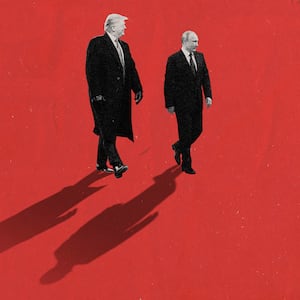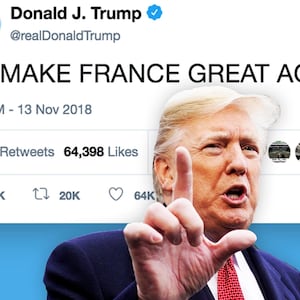UPDATE, March 9, 2019: Bloomberg reported Friday that the Trump administration "is drawing up demands that Germany, Japan and eventually any other country hosting U.S. troops pay the full price of American soldiers deployed on their soil—plus 50 percent or more for the privilege of hosting them." Many commentators were quick to denounce this as "protection money," and the words are well chosen, given that the president of the United States tends to think, talk, and act like a mobster.
The following article, published January 15 with the original headline "Trump Doesn’t Want Alliances Like NATO, He Wants U.S. Soldiers to Be Guns for Hire," cites evidence dating back to 2016 and explains why we should not be surprised by this latest move. Trump's treatment of longtime allies is destructive and dangerous. It is not new.
— Christopher Dickey
PARIS—Suspicions surrounding Donald Trump’s Russia connections have grown so intense that he’s now being asked directly, even on Fox News, whether he is working for Moscow. And every time he tries to slide by the issue, saying how insulted he is, the suspicions grow worse. At this point it’s an accusation hard for him to deny without giving it credence: “When did you stop beating your wife?” has become in effect, “When did you start taking orders from Russian President Vladimir Putin?”
Trump's insistence on meeting Putin one-on-one at Helsinki and other venues, along with Trump's reported talk about pulling out of NATO, all help to poison the atmosphere. A long Twitter thread by former FBI Special Agent Clint Watts is a particularly comprehensive list suggesting why Watts’ erstwhile colleagues were so suspicious of Trump in 2017 they opened a counterintelligence investigation of him as a potential Russian agent or source. “Special Counsel investigation must continue, this is a crisis, this is a national emergency,” Watts concludes.
But the situation is worse than that, and the damage much wider. Trump is aiding and abetting the nuclear-armed enemies of America — the same ones named in his administration’s own National Security Strategy — by doing everything he can to tear apart the alliances built to oppose and contain the blatant ambitions of Russia, China and North Korea.
Worse still, that’s Trump’s natural inclination.
What all of America's strategic enemies have learned to do is what any spy is taught in Spookery 101. The CIA's own job description for an operations officer (which is what Putin was for the Soviet KGB) tells applicants to “build relationships based on rapport and trust,” relying on the “ability to assess character and motivation.” The optimal arrangement is to find and exploit people who think they are making their own decisions while serving the recruiter's interests.
Whether enemy spymasters are watching Trump from Moscow, Beijing or Pyongyang, they must wake up every morning thanking Divine Providence for such an easy target as Donald Trump. His huge ego and his limited view of the world, often based on the weak arithmetic that earned him an infamous reputation for bankruptcies as a businessman, make him as president hugely vulnerable. Instead of making the United States great "again," he's making it weak as never before in our lifetimes.
The purpose of the alliances built by the United States over the last 70 years has been to extend American influence in times of peace and be force multipliers in times of war. They save American money, American manpower, and if it comes to a test of arms, American lives.
By undermining or eliminating those relationships Trump is creating a situation where any new military conflict will be vastly more expensive and dangerous. As a result, the United States may shrink from a confrontation, or indeed be outright defeated, especially if that conflict is with nuclear-armed Russia, China or North Korea. Meanwhile the many others who wish us ill — ISIS, Al Qaeda, Bashar al Assad, and Iran among them — will take heart.
Trump wants to see American allies paying more for their alliances. Up to a point this makes sense. Increased “burden sharing” has been the goal of many U.S. administrations. The idea was that the stronger the defenses of each member, the stronger the alliances.
But during Trump’s last trip to Europe his views on that subject became much clearer: He sees the American military as, essentially, an army of mercenaries paid by America’s allies to defend them. And it is perhaps more than coincidental that as Trump is ordering U.S. Special Forces out of Syria, Blackwater founder Erik Prince tells Fox Business they could be replaced by private contractors.
At Trump’s first NATO summit in May 2017, Trump talked as if NATO members were supposed to pay back dues, as if he were dunning Palm Beach residents who didn’t cough up the fees at Mar-a-Lago. This completely missed the point that the issue of burden sharing was about how big a proportion of a nation’s gross domestic product was consumed by its total defense spending.
The U.S. pours 3.6 percent of its GDP into defense. The target for all NATO members is 2 percent, but few meet it and Germany, the richest nation in Europe, spends only 1.2 percent. That said, the U.S. funds its military-industrial complex so it can project American power globally. None of the other NATO powers, even Britain and France, seriously pretend to such ambitions.
The New York Times reported on Monday that during the NATO summit in July last year, Trump actually considered pulling out of the organization altogether, which would effectively destroy it and hand Putin a huge strategic victory. That did not happen, not least because then-Defense Secretary James Mattis still dominated the internal debate on such issues. But when Trump returned to Europe in November, his position had evolved, or at least become more explicit.
Trump was furious with French President Emmanuel Macron for suggesting Europe should work harder to build its own defenses, which Macron found a little confusing since that is what Trump previously seemed to want.
In fact, Trump was reverting to an old, oft-repeated promise made during the 2016 campaign: “Countries that we're protecting have to pay what they're supposed to be paying." [Emphasis added.]
Trump doesn’t want NATO members to pay for their own defenses, he wants them to pay for the U.S. military to defend them. He wants them to buy American arms and underwrite the deployment of American soldiers, otherwise he’ll pack up and go home.
“It is time that these very rich countries either pay the United States for its great military protection, or protect themselves,” he tweeted after the Paris visit.
In the Middle East, this view of American soldiers as mercenaries in Donald Trump's employ fits nicely with the president's oft-stated desire to get more money out of the Saudis. Whenever confronted with the regime's increasingly murderous and erratic reputation, he falls back on promised arms sales of billions of dollars as justification for friendly relations.
The mercenary approach also meshes nicely with the Saudi view of warfare. The House of Saud and other Gulf states have long relied on hired cannon fodder from poorer countries to fight their wars. Most recently, Riyadh has been signing up underage boys from Sudan's devastated Darfur province to die in Yemen.
(It's obvious that Saudi Crown Prince Mohammed bin Salman, despite the murder accusations leveled against him in the Khashoggi case, has joined the ranks of Putin, Xi Jinping, and Kim Jong Un as an accomplished Trump puppeteer.)
But right now the real testing ground for Trump's "deals" for the use of the U.S. military is not in Europe, where there remain some constraints on Trump’s impulses, nor in the Middle East. It’s in Korea.
At issue, just as Trump is beseeching North Korean leader Kim Jong Un for a second summit, is the U.S. president’s demand that South Korea double last year’s share of the costs of keeping America’s 28,500 troops in the country.
The South Koreans, after 10 tempestuous and futile rounds of talks with the Americans, are having none of it, and who can blame them? Trump wants a stupendous 100 percent increase in South Korea’s share, which came last year to about $860 million. And instead of asking for a deal that would last five years, as previously, he wants to be able to negotiate this thing every year.
The Chinese, Russians—and most of all the North Koreans—must be delighted. One of Kim’s key strategic goals has been to get those American troops off the peninsula and out of the region. But there's also a twist. South Korea’s President Moon Jae-in is anxious to be the leader who brought about reconciliation on the Korean peninsula, and he may actually be happy about the impasse if it means a significant portion of the Americans leave.
“South Korea has withdrawn its delegation from the talks,” says Kim Tae-woo, formerly head of the Korea Institute for Defense Analyses. “It gives [Moon] a chance to get closer to North Korea. We worry for the U.S.-South Korean alliance.”
While Trump obsesses over the costs, he seems oblivious to the importance of the U.S. troop presence. They “play a pivotal role in telling North Korea that they're a trip-wire, crossing of which could mean a war with the U.S.,” said Shim Jae-hoon, former Far Eastern Economic Review correspondent. “That's what the mutual defense treaty is for.”
Take them away and in the event of a North Korean blitz, nuclear or not, the game could be over before Washington could organize militarily or politically to oppose it.
For the record, a spokesperson for the South Korean ministry of foreign affairs, responsible for the U.S.-South Korea talks, said it was “a common belief between the two countries that it will not affect our strong relationship and firm commitment to the alliance.” Picking words carefully, she added, “In the spirit of mutual understanding and respect, both countries will do our utmost to come to an agreement on military cost-sharing.”
No doubt, but the long-term impact could be quite unsettling, as made clear by Kyle Ferrier of the Korea Economic Institute, a Washington think tank funded by the Korean government.
“The most significant cost of the stalled negotiations is the erosion of trust in the United States as a reliable security partner,” he wrote in The Diplomat. “While there is room for Seoul to pay more into the relationship, the approach taken by the Trump administration … risks long-term U.S. strategic interests by potentially driving South Korea to look elsewhere for its security needs.”
That’s a conclusion that seems unavoidable while Trump goes around the world sacrificing alliances and military understandings on the altar of uncertain economic benefits, unsubstantiated cost analyses and no real savings when balanced against the loss of friends and allies.
Christopher Dickey reported from Paris, Donald Kirk reported from Seoul.










